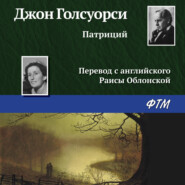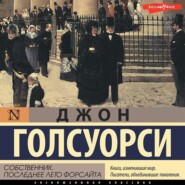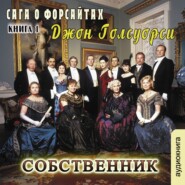По всем вопросам обращайтесь на: info@litportal.ru
(©) 2003-2024.
✖
Beyond
Настройки чтения
Размер шрифта
Высота строк
Поля
He got up then, and standing near, with his hands hard clenched at his sides, whispered:
“Have mercy! Speak to me!”
She could not. All was strange and mazed and quivering in her, her spirit straining away, drawn to him, fantastically confused. She could only look into his face with her troubled, dark eyes. And suddenly she was seized and crushed to him. She shrank away, pushing him back with all her strength. He hung his head, abashed, suffering, with eyes shut, lips trembling; and her heart felt again that quiver of compassion. She murmured:
“I don’t know. I will tell you later – later – in England.”
He bowed, folding his arms, as if to make her feel safe from him. And when, regardless of the rain, she began to move on, he walked beside her, a yard or so away, humbly, as though he had never poured out those words or hurt her lips with the violence of his kiss.
Back in her room, taking off her wet dress, Gyp tried to remember what he had said and what she had answered. She had not promised anything. But she had given him her address, both in London and the country. Unless she resolutely thought of other things, she still felt the restless touch of his hands, the grip of his arms, and saw his eyes as they were when he was kissing her; and once more she felt frightened and excited.
He was playing at the concert that evening – her last concert. And surely he had never played like that – with a despairing beauty, a sort of frenzied rapture. Listening, there came to her a feeling – a feeling of fatality – that, whether she would or no, she could not free herself from him.
V
Once back in England, Gyp lost that feeling, or very nearly. Her scepticism told her that Fiorsen would soon see someone else who seemed all he had said she was! How ridiculous to suppose that he would stop his follies for her, that she had any real power over him! But, deep down, she did not quite believe this. It would have wounded her belief in herself too much – a belief so subtle and intimate that she was not conscious of it; belief in that something about her which had inspired the baroness to use the word “fatality.”
Winton, who breathed again, hurried her off to Mildenham. He had bought her a new horse. They were in time for the last of the cubbing. And, for a week at least, the passion for riding and the sight of hounds carried all before it. Then, just as the real business of the season was beginning, she began to feel dull and restless. Mildenham was dark; the autumn winds made dreary noises. Her little brown spaniel, very old, who seemed only to have held on to life just for her return, died. She accused herself terribly for having left it so long when it was failing. Thinking of all the days Lass had been watching for her to come home – as Betty, with that love of woeful recital so dear to simple hearts, took good care to make plain – she felt as if she had been cruel. For events such as these, Gyp was both too tender-hearted and too hard on herself. She was quite ill for several days. The moment she was better, Winton, in dismay, whisked her back to Aunt Rosamund, in town. He would lose her company, but if it did her good, took her out of herself, he would be content. Running up for the week-end, three days later, he was relieved to find her decidedly perked-up, and left her again with the easier heart.
It was on the day after he went back to Mildenham that she received a letter from Fiorsen, forwarded from Bury Street. He was – it said – just returning to London; he had not forgotten any look she had ever given him, or any word she had spoken. He should not rest till he could see her again. “For a long time,” the letter ended, “before I first saw you, I was like the dead – lost. All was bitter apples to me. Now I am a ship that comes from the whirlpools to a warm blue sea; now I see again the evening star. I kiss your hands, and am your faithful slave – Gustav Fiorsen.” These words, which from any other man would have excited her derision, renewed in Gyp that fluttered feeling, the pleasurable, frightened sense that she could not get away from his pursuit.
She wrote in answer to the address he gave her in London, to say that she was staying for a few days in Curzon Street with her aunt, who would be glad to see him if he cared to come in any afternoon between five and six, and signed herself “Ghita Winton.” She was long over that little note. Its curt formality gave her satisfaction. Was she really mistress of herself – and him; able to dispose as she wished? Yes; and surely the note showed it.
It was never easy to tell Gyp’s feelings from her face; even Winton was often baffled. Her preparation of Aunt Rosamund for the reception of Fiorsen was a masterpiece of casualness. When he duly came, he, too, seemed doubly alive to the need for caution, only gazing at Gyp when he could not be seen doing so. But, going out, he whispered: “Not like this – not like this; I must see you alone – I must!” She smiled and shook her head. But bubbles had come back to the wine in her cup.
That evening she said quietly to Aunt Rosamund:
“Dad doesn’t like Mr. Fiorsen – can’t appreciate his playing, of course.”
And this most discreet remark caused Aunt Rosamund, avid – in a well-bred way – of music, to omit mention of the intruder when writing to her brother. The next two weeks he came almost every day, always bringing his violin, Gyp playing his accompaniments, and though his hungry stare sometimes made her feel hot, she would have missed it.
But when Winton next came up to Bury Street, she was in a quandary. To confess that Fiorsen was here, having omitted to speak of him in her letters? Not to confess, and leave him to find it out from Aunt Rosamund? Which was worse? Seized with panic, she did neither, but told her father she was dying for a gallop. Hailing that as the best of signs, he took her forthwith back to Mildenham. And curious were her feelings – light-hearted, compunctious, as of one who escapes yet knows she will soon be seeking to return. The meet was rather far next day, but she insisted on riding to it, since old Pettance, the superannuated jockey, charitably employed as extra stable help at Mildenham, was to bring on her second horse. There was a good scenting-wind, with rain in the offing, and outside the covert they had a corner to themselves – Winton knowing a trick worth two of the field’s at-large. They had slipped there, luckily unseen, for the knowing were given to following the one-handed horseman in faded pink, who, on his bang-tailed black mare, had a knack of getting so well away. One of the whips, a little dark fellow with smouldery eyes and sucked-in weathered cheeks, dashed out of covert, rode past, saluting, and dashed in again. A jay came out with a screech, dived, and doubled back; a hare made off across the fallow – the light-brown lopping creature was barely visible against the brownish soil. Pigeons, very high up, flew over and away to the next wood. The shrilling voices of the whips rose from the covert-depths, and just a whimper now and then from the hounds, swiftly wheeling their noses among the fern and briers.
Gyp, crisping her fingers on the reins, drew-in deep breaths. It smelled so sweet and soft and fresh under that sky, pied of blue, and of white and light-grey swift-moving clouds – not half the wind down here that there was up there, just enough to be carrying off the beech and oak leaves, loosened by frost two days before. If only a fox would break this side, and they could have the first fields to themselves! It was so lovely to be alone with hounds! One of these came trotting out, a pretty young creature, busy and unconcerned, raising its tan-and-white head, its mild reproachful deep-brown eyes, at Winton’s, “Loo-in Trix!” What a darling! A burst of music from the covert, and the darling vanished among the briers.
Gyp’s new brown horse pricked its ears. A young man in a grey cutaway, buff cords, and jack-boots, on a low chestnut mare, came slipping round the covert. Oh – did that mean they were all coming? Impatiently she glanced at this intruder, who raised his hat a little and smiled. That smile, faintly impudent, was so infectious, that Gyp was melted to a slight response. Then she frowned. He had spoiled their lovely loneliness. Who was he? He looked unpardonably serene and happy sitting there. She did not remember his face at all, yet there was something familiar about it. He had taken his hat off – a broad face, very well cut, and clean-shaved, with dark curly hair, extraordinary clear eyes, a bold, cool, merry look. Where had she seen somebody like him?
A tiny sound from Winton made her turn her head. The fox – stealing out beyond those further bushes! Breathless, she fixed her eyes on her father’s face. It was hard as steel, watching. Not a sound, not a quiver, as if horse and man had turned to metal. Was he never going to give the view-halloo? Then his lips writhed, and out it came. Gyp cast a swift smile of gratitude at the young man for having had taste and sense to leave that to her father, and again he smiled at her. There were the first hounds streaming out – one on the other – music and feather! Why didn’t Dad go? They would all be round this way in a minute!
Then the black mare slid past her, and, with a bound, her horse followed. The young man on the chestnut was away on the left. Only the hunts-man and one whip – beside their three selves! Glorious! The brown horse went too fast at that first fence and Winton called back: “Steady, Gyp! Steady him!” But she couldn’t; and it didn’t matter. Grass, three fields of grass! Oh, what a lovely fox – going so straight! And each time the brown horse rose, she thought: “Perfect! I CAN ride! Oh, I am happy!” And she hoped her father and the young man were looking. There was no feeling in the world like this, with a leader like Dad, hounds moving free, good going, and the field distanced. Better than dancing; better – yes, better than listening to music. If one could spend one’s life galloping, sailing over fences; if it would never stop! The new horse was a darling, though he DID pull.
She crossed the next fence level with the young man, whose low chestnut mare moved with a stealthy action. His hat was crammed down now, and his face very determined, but his lips still had something of that smile. Gyp thought: “He’s got a good seat – very strong, only he looks like ‘thrusting.’ Nobody rides like Dad – so beautifully quiet!” Indeed, Winton’s seat on a horse was perfection, all done with such a minimum expenditure. The hounds swung round in a curve. Now she was with them, really with them! What a pace – cracking! No fox could stand this long!
And suddenly she caught sight of him, barely a field ahead, scurrying desperately, brush down; and the thought flashed through her: ‘Oh! don’t let’s catch you. Go on, fox; go on! Get away!’ Were they really all after that little hunted red thing – a hundred great creatures, horses and men and women and dogs, and only that one little fox! But then came another fence, and quickly another, and she lost feelings of shame and pity in the exultation of flying over them. A minute later the fox went to earth within a few hundred yards of the leading hound, and she was glad. She had been in at deaths before – horrid! But it had been a lovely gallop. And, breathless, smiling rapturously, she wondered whether she could mop her face before the field came up, without that young man noticing.
She could see him talking to her father, and taking out a wisp of a handkerchief that smelled of cyclamen, she had a good scrub round. When she rode up, the young man raised his hat, and looking full at her said: “You did go!” His voice, rather high-pitched, had in it a spice of pleasant laziness. Gyp made him an ironical little bow, and murmured: “My new horse, you mean.” He broke again into that irrepressible smile, but, all the same, she knew that he admired her. And she kept thinking: ‘Where HAVE I seen someone like him?’
They had two more runs, but nothing like that first gallop. Nor did she again see the young man, whose name – it seemed – was Summerhay, son of a certain Lady Summerhay at Widrington, ten miles from Mildenham.
All that long, silent jog home with Winton in fading daylight, she felt very happy – saturated with air and elation. The trees and fields, the hay-stacks, gates, and ponds beside the lanes grew dim; lights came up in the cottage windows; the air smelled sweet of wood smoke. And, for the first time all day, she thought of Fiorsen, thought of him almost longingly. If he could be there in the cosy old drawing-room, to play to her while she lay back – drowsing, dreaming by the fire in the scent of burning cedar logs – the Mozart minuet, or that little heart-catching tune of Poise, played the first time she heard him, or a dozen other of the things he played unaccompanied! That would be the most lovely ending to this lovely day. Just the glow and warmth wanting, to make all perfect – the glow and warmth of music and adoration!
And touching the mare with her heel, she sighed. To indulge fancies about music and Fiorsen was safe here, far away from him; she even thought she would not mind if he were to behave again as he had under the birch-trees in the rain at Wiesbaden. It was so good to be adored. Her old mare, ridden now six years, began the series of contented snuffles that signified she smelt home. Here was the last turn, and the loom of the short beech-tree avenue to the house – the old manor-house, comfortable, roomy, rather dark, with wide shallow stairs. Ah, she was tired; and it was drizzling now. She would be nicely stiff to-morrow. In the light coming from the open door she saw Markey standing; and while fishing from her pocket the usual lumps of sugar, heard him say: “Mr. Fiorsen, sir – gentleman from Wiesbaden – to see you.”
Her heart thumped. What did this mean? Why had he come? How had he dared? How could he have been so treacherous to her? Ah, but he was ignorant, of course, that she had not told her father. A veritable judgment on her! She ran straight in and up the stairs. The voice of Betty, “Your bath’s ready, Miss Gyp,” roused her. And crying, “Oh, Betty darling, bring me up my tea!” she ran into the bathroom. She was safe there; and in the delicious heat of the bath faced the situation better.
There could be only one meaning. He had come to ask for her. And, suddenly, she took comfort. Better so; there would be no more secrecy from Dad! And he would stand between her and Fiorsen if – if she decided not to marry him. The thought staggered her. Had she, without knowing it, got so far as this? Yes, and further. It was all no good; Fiorsen would never accept refusal, even if she gave it! But, did she want to refuse?
She loved hot baths, but had never stayed in one so long. Life was so easy there, and so difficult outside. Betty’s knock forced her to get out at last, and let her in with tea and the message. Would Miss Gyp please to go down when she was ready?
VI
Winton was staggered. With a glance at Gyp’s vanishing figure, he said curtly to Markey, “Where have you put this gentleman?” But the use of the word “this” was the only trace he showed of his emotions. In that little journey across the hall he entertained many extravagant thoughts. Arrived at the study, he inclined his head courteously enough, waiting for Fiorsen to speak. The “fiddler,” still in his fur-lined coat, was twisting a squash hat in his hands. In his own peculiar style he was impressive. But why couldn’t he look you in the face; or, if he did, why did he seem about to eat you?
“You knew I was returned to London, Major Winton?”
Then Gyp had been seeing the fellow without letting him know! The thought was chill and bitter to Winton. He must not give her away, however, and he simply bowed. He felt that his visitor was afraid of his frigid courtesy; and he did not mean to help him over that fear. He could not, of course, realize that this ascendancy would not prevent Fiorsen from laughing at him behind his back and acting as if he did not exist. No real contest, in fact, was possible between men moving on such different planes, neither having the slightest respect for the other’s standards or beliefs.
Fiorsen, who had begun to pace the room, stopped, and said with agitation:
“Major Winton, your daughter is the most beautiful thing on earth. I love her desperately. I am a man with a future, though you may not think it. I have what future I like in my art if only I can marry her. I have a little money, too – not much; but in my violin there is all the fortune she can want.”
Winton’s face expressed nothing but cold contempt. That this fellow should take him for one who would consider money in connection with his daughter simply affronted him.
Fiorsen went on:
“You do not like me – that is clear. I saw it the first moment. You are an English gentleman” – he pronounced the words with a sort of irony – “I am nothing to you. Yet, in MY world, I am something. I am not an adventurer. Will you permit me to beg your daughter to be my wife?” He raised his hands that still held the hat; involuntarily they had assumed the attitude of prayer.
For a second, Winton realized that he was suffering. That weakness went in a flash, and he said frigidly:
“I am obliged to you, sir, for coming to me first. You are in my house, and I don’t want to be discourteous, but I should be glad if you would be good enough to withdraw and take it that I shall certainly oppose your wish as best I can.”
The almost childish disappointment and trouble in Fiorsen’s face changed quickly to an expression fierce, furtive, mocking; and then shifted to despair.
“Major Winton, you have loved; you must have loved her mother. I suffer!”
Winton, who had turned abruptly to the fire, faced round again.
“I don’t control my daughter’s affections, sir; she will do as she wishes. I merely say it will be against my hopes and judgment if she marries you. I imagine you’ve not altogether waited for my leave. I was not blind to the way you hung about her at Wiesbaden, Mr. Fiorsen.”
Fiorsen answered with a twisted, miserable smile:
“Poor wretches do what they can. May I see her? Let me just see her.”
Was it any good to refuse? She had been seeing the fellow already without his knowledge, keeping from him – HIM – all her feelings, whatever they were. And he said:
“I’ll send for her. In the meantime, perhaps you’ll have some refreshment?”
Fiorsen shook his head, and there followed half an hour of acute discomfort. Winton, in his mud-stained clothes before the fire, supported it better than his visitor. That child of nature, after endeavouring to emulate his host’s quietude, renounced all such efforts with an expressive gesture, fidgeted here, fidgeted there, tramped the room, went to the window, drew aside the curtains and stared out into the dark; came back as if resolved again to confront Winton; then, baffled by that figure so motionless before the fire, flung himself down in an armchair, and turned his face to the wall. Winton was not cruel by nature, but he enjoyed the writhings of this fellow who was endangering Gyp’s happiness. Endangering? Surely not possible that she would accept him! Yet, if not, why had she not told him? And he, too, suffered.

















